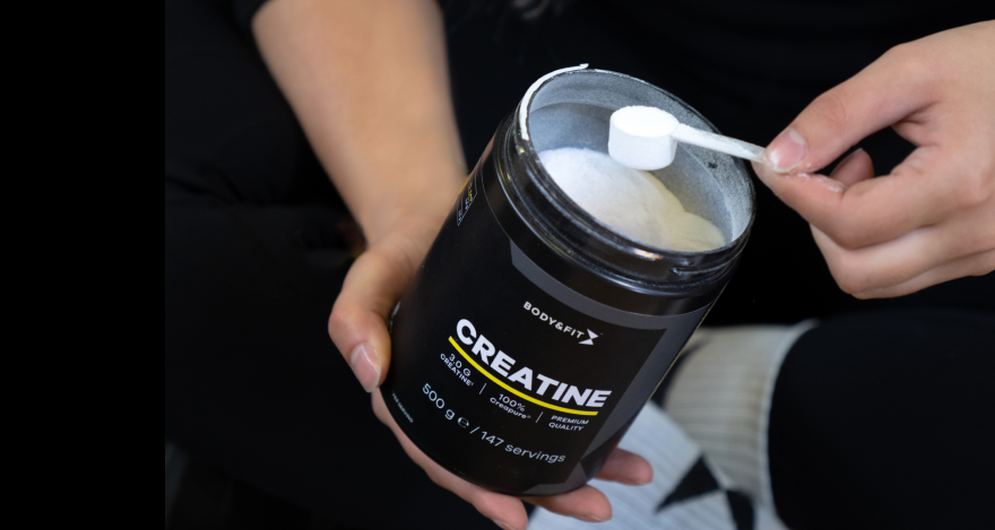EVERYTHING YOU NEED TO KNOW ABOUT CREATINE

Creatine is one of the most popular and widely used supplements in the fitness space. It’s a natural compound that is found in small amounts in the body's muscles as well as foods like meat and fish. Despite the popularity of creatine supplements, like creatine monohydrate, there is still some confusion and controversy surrounding them. Here, we’ll explore the benefits of creatine, the science behind it, its potential benefits, and how to use it safely and effectively to achieve your unique health & fitness goals.
What is creatine?
Creatine is a naturally occurring bodily substance formed from three amino acids: arginine, glycine and methionine. Your body produces about one gram of creatine per day. It’s also found in food, especially meat and fish. If you wanted to get enough from your diet to see results in your performance, you need around 5 grams. For that, you’d have to eat about one kilo of beef or 1.2 kilos of chicken per day. Therefore, anyone enhancing their training regime usually uses creatine supplements like our Body&Fit Creatine Monohydrate.
Why is it necessary to take creatine supplements?
If you’re looking to saturate your creatine storage, it is hard to generate enough from diet alone1. You would need to eat a ton of meat every day. Additionally, vegetarians will find it hard to get enough from their diet to saturate their stores. It’s popular to saturate creatine stores because it increases physical performance in successive bursts of short-term, high intensity exercise. This can help athletes get the most out of their training sessions.
What are the best creatine supplements?
Our top creatine supplements, including creatine monohydrate, powders, tabs and capsules:
How does creatine actually affect the body?
When we exercise, our bodies use a molecule called ATP (adenosine triphosphate) for energy. We only have a limited amount of ATP available in our muscles, and once it's used up, we start to feel tired and fatigued. When we take creatine supplements, it helps our bodies produce more ATP, enhancing the body's ability to perform short-duration, high-intensity exercises, such as weightlifting and sprinting.
Does creatine make you look bigger?
When you take creatine supplements like creatine monohydrate, it can cause your muscles to hold onto more water, which can make them look a little bit fuller and more "pumped up". For some, this is one of the benefits of creatine. This effect is often more noticeable in the first few weeks of taking creatine, and it can vary from person to person. Here's the thing, though: while creatine can make your muscles look a bit bigger, it won't actually increase your muscle mass or make you gain weight on its own. To build muscle, you still need to put in the work with regular exercise and a healthy diet.
That being said, some people do report experiencing a slight increase in weight when they first start taking creatine supplements, due to the water retention effect. Although, this isn't usually a significant amount of weight, and it's not the same thing as gaining actual muscle mass.
Does creatine make you gain weight?
A logical consequence of fluid retention, even in muscles, is increased body weight. So, most people do see an increase in weight of a kilo to two over a couple of weeks when using creatine supplements. Obviously, those wanting to lose weight tend not to see this as one of the benefits of creatine supplements. However, the weight is held mostly in the muscles, making them bigger and fuller, so it really depends on what effect you’re after.
After that initial retention period, subsequent gains are due to the increase in the workload your muscle can handle, according to Paul Greenhaff, Ph.D., professor of muscle metabolism at the University of Nottingham in England. Some guys think that if they take creatine and don’t work out, they’ll put on fat — but this just isn’t true. “Creatine contains no calories, and has no impact on your fat metabolism,” he explains. “So taking creatine and not working out is just going to lead to nothing.”
What are the benefits of creatine?
Creatine increases the body’s ability to produce energy rapidly. It’s very straightforward: if you're able to lift more weight in the gym, you're able to create more of the muscle fibre tears that your body can then repair and rebuild bigger and stronger after your workout. It essentially helps you to keep going past the burn, past the maximum point you can usually get to, or push past what you achieved in your workout before.
According to the U.S. National Library of Medicine’s MedlinePlus, creatine is rated as ‘possibly effective’ when it comes to improving muscle strength2.
Which athletes get the benefits of creatine?
As mentioned before, athletes who make short and powerful movements can really experience benefits of creatine because they use it as a source of energy during exercise. These can be strength athletes, like weightlifters and bodybuilders, but also sprinters and high jumpers. Really anyone who is looking to do an intensive workout, up their training regimes, and push themselves can improve their performance thanks to the benefits of creatine.
Creatine monohydrate as nutritional supplement
Creatine monohydrate is one of the most common forms of creatine supplements on the market. It's basically a powder made up of creatine molecules and a single molecule of water (hence the "monohydrate" part). One of the reasons creatine monohydrate is so popular is because it's relatively affordable and easy to find. It's also been studied extensively and has been shown to be safe and effective for most people when used as directed.
Maximise effects through combining creatine with fast carbohydrates
Creatine’s absorbability is thought to be improved by combining it with fast carbohydrates3. It is therefore wise to use creatine supplements at the same time as a carbohydrate-rich meal or carbohydrate supplement. Examples of this are Dextrose Pure and Maltodextrin. This is also called taking a creatine ‘shuttle’. It’s thought the carb source creates a big insulin spike that shuttles it into muscles most effectively.
The top ways to take creatine
There are many different recommendations on how to take creatine. It’s mostly about finding a way that works for you. You can easily mix creatine with a drink of your choice, be it in your protein shake, in a delicious fruit juice (apart from orange juice as the acidity is thought to negate those positive effects) or simply in a glass of water. Alternatively, you can take creatine supplements, including creatine monohydrate, in tablet or capsule form.
When should I take creatine supplements?
To keep your creatine storage saturated, it's important to use creatine supplements consistently. That means taking it on training days as well as rest days. Some believe it's best to take after your workout, as your levels are likely in need of replenishment at that time. But really, it's all about finding a way to fit it into your personal routine.
If you wish to take more on a training day (i.e. 5-10 gm) or you’re doing a fast loading phase, you can try dividing your dose, taking half pre-workout and the remaining half post-workout to avoid intestinal discomfort.
Should I take creatine every day?
Although the body makes only 1-2 grams per day, the odds are good that your body can handle an intake of 5 or more grams per day. Anybody over 200 pounds can take 10 grams quite safely provided that they drink sufficient fluids (to avoid cramping). Some people have been taking as much as 20-30 grams a day since it was first available in 1990. We recommend a loading phase so we recommend taking 1 scoop per day for 28 days. After this your levels will be elevated, you can keep them elevated by continuing the 1 scoop per day. If you want even faster results you can take 4 times this quantity for the first 5 days, then maintain levels by taking 3 grams a day after that. Most creatine products give you their user guidelines on the packet on how long, how often, and how much to take.
Is creatine safe?
As creatine is a compound made up of multiple amino acids already present in bodies and it’s manufactured in humans and animals, it is a totally safe supplement. The human body has 100-115 grams of creatine in the form of creatine phosphate at any one time. No negative side effects have been noted in research with the recommended levels of supplementation. It is not recommended that you take creatine if you have kidney issues though, as this is where excess is excreted out the body. Also, pregnant and breastfeeding mothers, those taking prescription medicines, or those who have any underlying health issues should talk to a healthcare professional when starting up with new supplements.
We hope this has been useful on some of the theories around creatine usage, and why creatine supplements, like creatine monohydrate, are so popular. If your focus is on muscle boosting, it’s a supplement everyone already talks about, and the industry is continuously learning new things about how the body works with creatine supplements.
And it’s also useful to know…
It’s impossible to say creatine will definitely work for you and increase strength, power and body mass. Creatine has different effects on every individual. Some people just don’t respond to it— it’s a genetic thing. If you've just started taking creatine monohydrate, for example, you should know if it works for you within a few weeks. If your training muscle volume increases, it’s working for you. If not, you’re probably a non-responder. And you need to put in the training work with a pretty heavy strengthening routine. You can’t just take it, sit back and expect to see results without the workouts to match.
Sources:
-
Creatine: Uses, benefits, and health risks (medicalnewstoday.com)
-
National Library of Medicine’s MedlinePlus
-
Protein- and carbohydrate-induced augmentation of whole body creatine retention in humans - PubMed (nih.gov)




